
views
X
Trustworthy Source
New England Journal of Medicine
World's Leading Medical Journal
Go to source
If your poop floats every once in a while and you don’t have any other symptoms, you can probably chalk it up to something you ate. If you have other symptoms that are popping up along with your floating stools, you may have some underlying condition. While your diet is still the most likely reason that your stool is floating, you should still talk to your doctor to see what they say about it if this goes on for more than few days.[2]
X
Research source
Adjusting Your Diet

Avoid alcohol and sugary drinks for a few days to see if that helps. Floating stools are typically a sign that there’s too much air or gas in your GI tract. To cut back on the gas and air, stop drinking sugary or carbonated beverages for a couple of days. Drinking a lot of alcohol can upset your stomach and release gases as well, so cut back on your drinking and see if the problem resolves itself. If you don’t have any other worrying symptoms and you can get your stool to sink just by changing your diet, you probably don’t need to worry about this. If you consume too much sugar, it can start fermenting in your stomach. This can make you gassy.
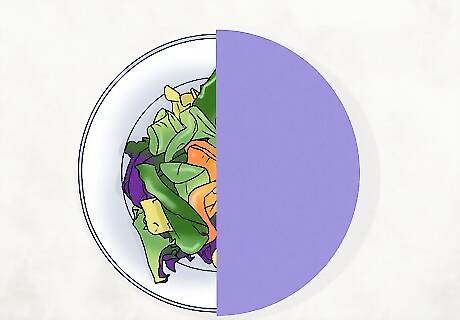
Cut back on the veggies to see if the floating poop starts to sink. Vegetables are good for you, but they are pretty difficult for your body to digest completely. They also tend to release a lot of gas as they break down in your digestive tract. Try cutting back on the salads and leafy greens for 3-4 days to see if your floaters suddenly start sinking. If the veggies are the cause of the problem, you really shouldn’t worry about your stool floating. Eat your greens and just try to maintain a balanced diet.
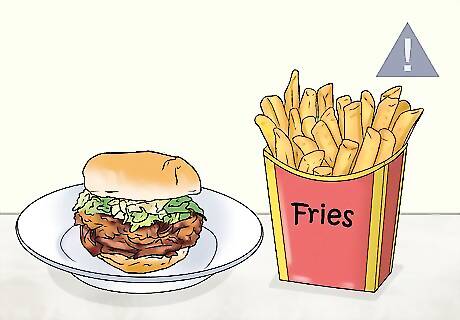
Limit your fat consumption to see if it helps at all. Excess fats in your stool will cause it to float, although this is probably unlikely to be the main source of the floaters. It’s much more likely that something about the fatty food is making you gassy, but it’s kind of irrelevant for your purposes. Try cutting unhealthy, high-fat foods out of your diet for a week or so to see if your stools stop floating. Just eat healthy fats for a week and see what happens. For example, you may swap out the 75/25 ground beef for some ground turkey, and you could skip the ribeye steak and go for a lean fish. There is some disagreement in the medical community over whether consuming fat causes stool to float at all since your body normally processes the fats you eat. This may not help with your floating stools, but how much can cutting unhealthy fats out of your food really hurt?

Try an elimination diet to rule out common food intolerances. An elimination diet is where you stop eating a certain ingredient or food group to see how your body responds. The goal here is to identify if you have a food intolerance that’s causing your stools to be airy or gassy. Cut a food group out of your diet for a week or two and see how your stools respond before moving on to the next usual suspect. If a food is upsetting your GI tract, you can work on eliminating it permanently from your diet. The food groups that you’re most likely to be intolerant to include: Dairy Eggs Fish or shellfish Peanuts or tree nuts (like almonds and cashews) Wheat Soy
Going in for a Checkup
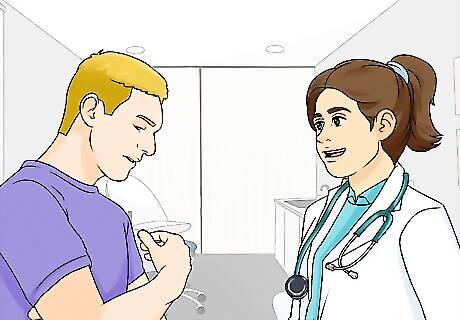
Don’t feel embarrassed about talking to your doctor about your stool. Yes, poop is kind of gross and every kid grows up making poop jokes for a reason. But defecation is just a normal part of the human body. On top of that, doctors spend their days talking about all kinds of nasty topics with their patients. They don’t feel weird about it, so why should you? Try not to shy away from discussing your floating stool with your doctor. Just be honest with your doctor and remind yourself that your floating stools could be the sign of something serious. It’s unlikely that there’s a problem, but you’re better safe than sorry. If you don’t have a fever, dizziness, bloody stools, jaundice, or weight loss, you can just bring up your floating stools at your next doctor’s appointment. You typically don’t need to run out to the doctor just to treat your floating stools.
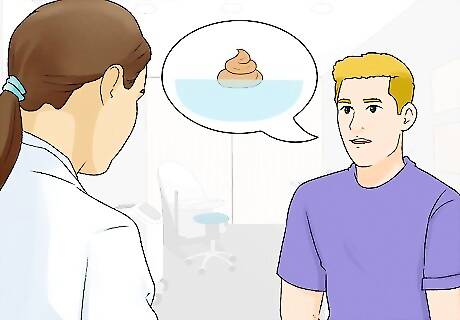
Meet with your doctor and describe your symptoms in detail. Schedule an appointment with your primary care doctor or bring it up at your next yearly physical. Describe the color, consistency, and look of your stools when they float. Your doctor will ask a few diagnostic questions and walk you through whether it may be a problem or not. Let your doctor know about any adjustments you made to your diet beforehand and describe how these changes impacted your stool. In most cases, a doctor is just going to tell you not to worry about it.
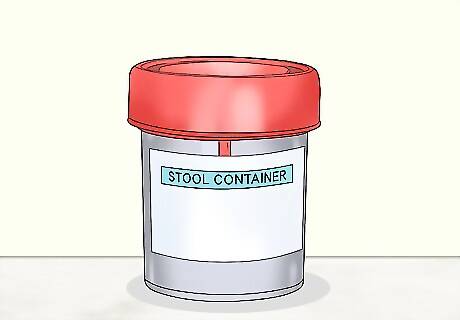
Provide a stool sample if your doctor wants to have it analyzed. If your doctor wants more information, they may send you home with a kit to take a stool sample. You may be able to do this at the office if you’re ready to use the bathroom. Once you provide the sample, your doctor will send it off to a lab for analysis and they’ll contact you with the results. The odds are that if your stools float, your doctor is ordering this test to analyze the fat content in your stool to see how your body is absorbing nutrients. The results will indicate if you have malabsorption, which can be caused by your intestines, the enzymes in your pancreas, or your liver’s inability to produce bile. The stool sample will also reveal if you have a parasite, virus, or bacteria causing your stools to float. These are rarely the cause for your floating stools unless you have some other symptoms, though. Doctors don’t typically order colonoscopies for floating stools, but they may order something called a Sudan stain where they dye your stool sample to assess the fat contents. You won’t need to do anything for this, though
Addressing More Concerning Symptoms
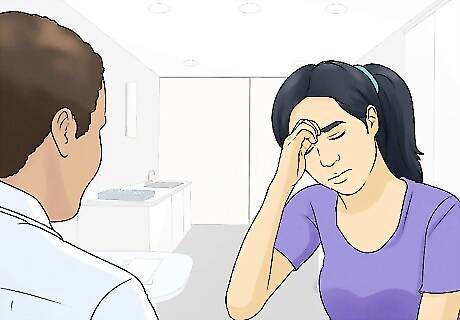
See your doctor right away if you have bloody stools, dizziness, or a fever. If your stools are floating and they’re bloody, contact your doctor to get in as soon as possible. You also need to see a doctor if you have dizziness or a fever associated with floating stools. A combination of these symptoms can indicate a variety of issues, but they need to be addressed sooner rather than later just to be on the safe side. Bloody stools can be bright red, or dark black. Bright red blood is a sign of bleeding in the lower GI tract, which could be caused by trauma, hemorrhoids, or something else. If the stool is tarry or black, it could be internal bleeding, an ulcer, or inflammation in your upper GI tract.
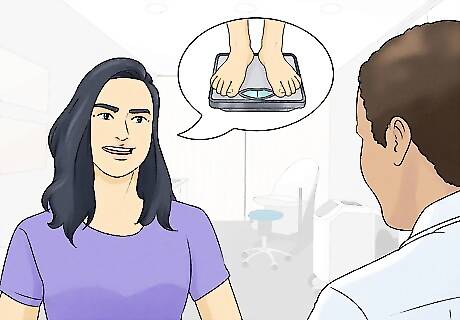
Ask a doctor about malabsorption if you’re losing weight. Floating stools may be filled with excess air or gas because your body isn’t processing nutrients correctly. If you notice that you’re losing weight over time when you aren’t changing your diet or exercise routine, it may be a sign of malabsorption. Weigh yourself over the course of a few weeks without changing your diet to see if you really are losing weight if you want to know for sure. If you think you may have malabsorption, contact your doctor. This isn’t an emergency, but you should see them sooner rather than later. Malabsorption can be caused by dozens of different conditions; some are serious, while others are quite easy to deal with. If you are suffering from malabsorption, you’ll typically have diarrhea with some regularity. You may also have bloating, or a feeling like you shouldn’t eat specific foods you used to enjoy.
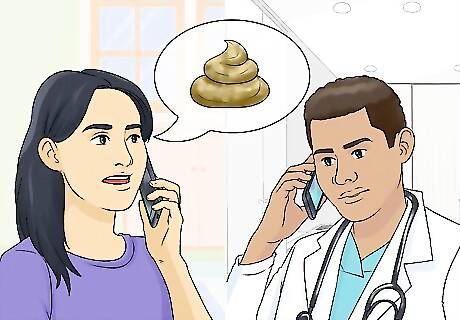
Contact a doctor right away if your stools are greasy and you have jaundice. If your stools float, look like they’re covered in grease, and your skin is turning yellow or pale, see a doctor right away. These are signs of pancreatic cancer. Your doctor will be able to run diagnostic tests to determine if you need to start treatment. Try not to worry for now—the odds are high that you don’t have pancreatic cancer, but you do need to address these symptoms. Other common signs of pancreatic cancer include: Dark urine Abdominal or back pain Nausea, vomiting, weakness, or lethargy Loss of appetite




















Comments
0 comment